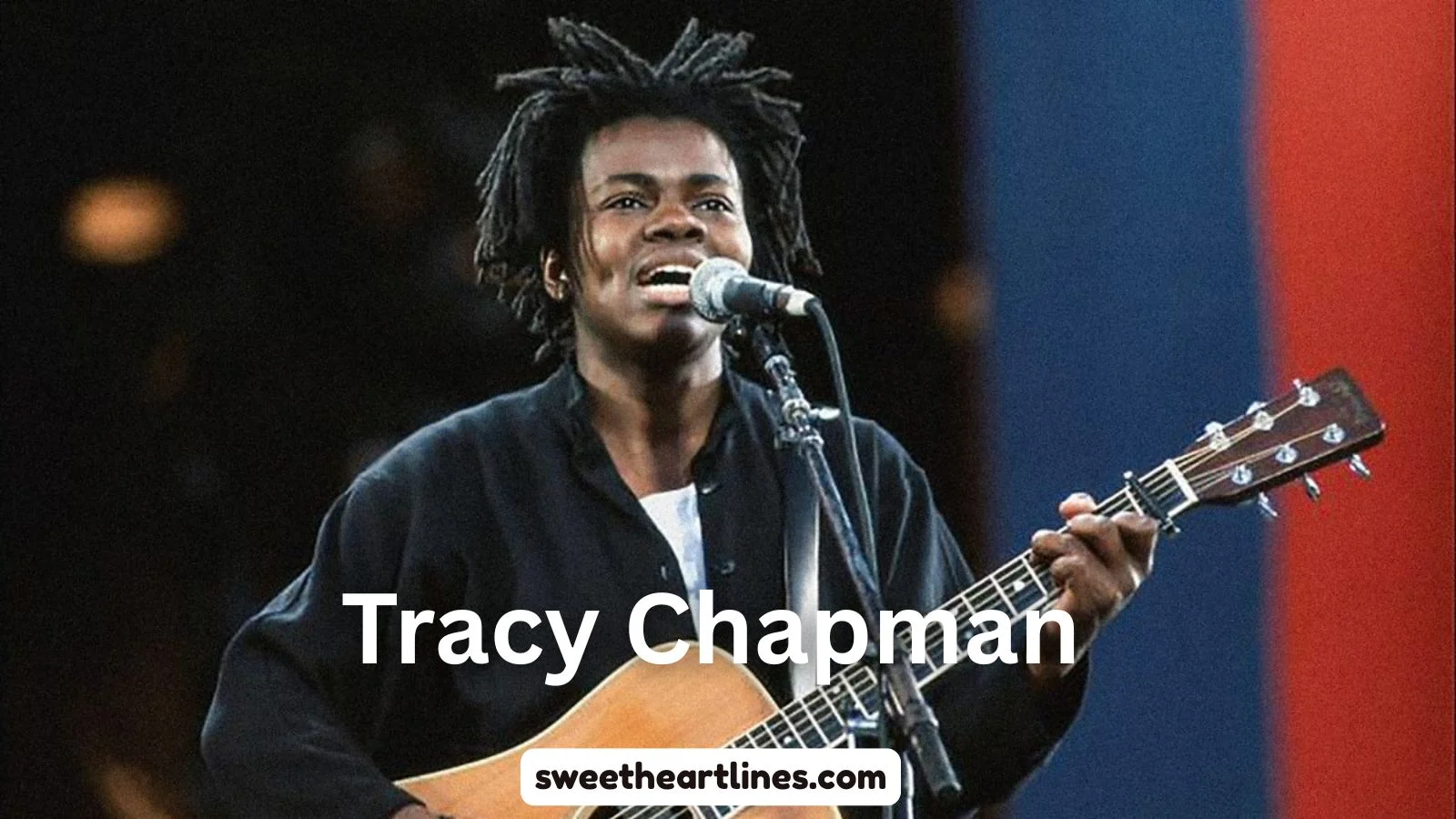Few musicians manage to create songs that feel eternal, capable of reaching across decades and still striking a nerve in listeners of every age. Tracy Chapman is one of those rare voices. She doesn’t just sing—she tells stories, pulling listeners into worlds of hardship, hope, and human connection.
Whether you first heard her through Fast Car blasting from a cassette player in the late 80s or caught the viral resurgence of the song in 2024 with Luke Combs, Chapman’s artistry proves one simple fact: great music never expires.
Early Life and Roots
Tracy Chapman was born on March 30, 1964, in Cleveland, Ohio, to a working-class family. Growing up, she was drawn to music early, receiving a ukulele at age three and later teaching herself guitar.
Her childhood wasn’t filled with luxury, but it was rich in resilience. Chapman attended an elite boarding school in Connecticut thanks to an A Better Chance scholarship, which gave her access to opportunities her environment couldn’t otherwise provide. Later, at Tufts University, she studied anthropology and African studies, sharpening her lens for human struggle and social justice.
These early experiences infused her lyrics with an unmatched empathy. She didn’t just write songs; she crafted mirrors of society, reflecting what many were afraid to say out loud.
The Breakthrough: Fast Car and Its Ripple Effect
When Chapman released her self-titled debut album in 1988, few expected it to shake the world. Yet Fast Car quickly became a cultural touchstone.
The song is more than melody—it’s a narrative journey. A young woman longs to escape poverty and domestic struggle through the symbolic promise of a fast car. But reality, heavy with financial burdens and emotional scars, keeps pulling her back.
- Billboard Hot 100: Peaked at No. 6
- Grammy Awards: Won Best Female Pop Vocal Performance
- Critical acclaim: Heralded as one of the best story-songs ever written
Beyond charts and trophies, the song resonated because it told the truth. People in rural towns, inner cities, and everywhere in between saw themselves in its verses. Fast Car became an anthem for ordinary struggles, one that still hits home today.
Storytelling Through Music
Chapman’s songs are short stories in melody. She doesn’t rely on flashy production or gimmicks. Instead, she creates worlds with words.
Examples include:
- Behind the Wall – A chilling, instrument-free ballad about domestic violence, emphasizing the silence surrounding victims.
- Baby Can I Hold You – A ballad on love and regret, exploring how hard it is to say simple words like “sorry” and “I love you.”
- Crossroads – A reflection on identity and the consequences of life choices.
Her style feels almost literary. If Bob Dylan wrote folk poetry for the 60s, Tracy Chapman penned folk stories for the modern world.
The Cultural and Political Impact of Her Songs
Chapman’s voice has always carried a political weight. In the late 80s, when pop was dominated by synth beats and love ballads, Chapman dared to sing about:
- Economic inequality (Talkin’ Bout a Revolution)
- Racism and injustice (Across the Lines)
- Gender-based violence (Behind the Wall)
Her music wasn’t just art—it was activism. She used her platform to bring social issues into mainstream conversation. For many listeners, Chapman’s songs were the first time they confronted hard realities wrapped in gentle melodies.
Tracy Chapman and Folk Revival
By the late 80s, folk music had largely been overshadowed by rock and dance-pop. Chapman’s arrival reintroduced acoustic authenticity to a new generation.
Her stripped-down style—just a guitar and a voice—reminded audiences of the power of simplicity. Much like Joan Baez or Joni Mitchell, Chapman proved that one person with a guitar could still shake the system.
Why Fast Car Still Resonates Across Generations
Every decade finds new meaning in Fast Car. Why? Because the themes are timeless:
- Economic struggle → Rising rents, stagnant wages, and generational poverty are still realities.
- Dreams of escape → Who hasn’t fantasized about starting fresh somewhere new?
- Love as salvation → That universal hope—that love might save us—still lingers.
In 2024, when Luke Combs covered the song at the Grammys alongside Chapman, a new generation rediscovered its depth. The duet wasn’t just a performance; it was a passing of the torch, showing how Chapman’s words still breathe truth today.
Chapman’s Other Iconic Works Beyond the Spotlight
Though Fast Car is her signature hit, Chapman’s catalog is full of gems:
- Give Me One Reason – A bluesy anthem that became another Grammy-winning hit in the 90s.
- The Promise – A tender song about love and longing, beloved at weddings and quiet moments.
- Subcity – A track about urban poverty and the invisibility of marginalized communities.
Each piece showcases Chapman’s ability to merge personal emotion with universal truths.
The Mystery of Her Private Life
Unlike many celebrities, Chapman has remained deeply private. She avoids the spotlight, rarely gives interviews, and keeps her personal relationships away from the tabloids.
This mystery has only added to her aura. In an industry where oversharing is often the norm, Chapman’s silence feels like an act of rebellion. She lets the music speak louder than her image.
Influence on Modern Artists
Chapman’s influence stretches far beyond her own discography. Artists across genres cite her as inspiration:
- Adele – For her raw emotional delivery.
- Brandi Carlile – For her folk storytelling roots.
- H.E.R. – For her honesty and stripped-down style.
- Luke Combs – Whose Grammy duet sparked Chapman’s return to the spotlight.
Her reach proves that authenticity never goes out of style.
Tracy Chapman and Representation: Race, Gender, and Authenticity
Chapman broke barriers as a Black woman in a genre often dominated by white male voices. Her presence in folk challenged stereotypes and broadened the genre’s cultural scope.
She also defied gender norms, singing unapologetically about love, struggle, and identity without conforming to industry pressures. By being authentically herself, Chapman paved the way for others to do the same.
Live Performances That Left a Mark
Chapman’s performances are legendary for their intimacy and impact.
One of the most iconic came at the 1988 Nelson Mandela 70th Birthday Tribute. When technical issues cut another act short, Chapman was asked to perform with nothing but her guitar. Her solo rendition of Fast Car stunned the audience and catapulted her to global recognition.
It wasn’t just about her voice—it was about the truth behind it.
Awards, Recognition, and Legacy
Over her career, Chapman has earned:
- 4 Grammy Awards
- An American Music Award
- A Billboard Music Award
- Worldwide respect as a socially conscious artist
But beyond awards, her greatest achievement is her lasting legacy. Decades later, new fans continue to discover her, proving her music’s timeless relevance.
The 2024 Grammys Moment with Luke Combs
In 2024, Chapman surprised the world by performing Fast Car alongside country star Luke Combs. The performance was hailed as one of the greatest Grammy moments of the decade.
For many, it wasn’t just nostalgia—it was validation. Chapman’s words still resonate powerfully, even in a new musical landscape. The performance also sparked renewed interest in her catalog, reminding everyone why she remains a cultural icon.
What We Can Learn from Chapman’s Career
Tracy Chapman teaches us that:
- Authenticity wins → You don’t need glitz to make an impact.
- Silence is powerful → Privacy in a loud world can become its own form of resistance.
- Simplicity is timeless → A guitar, a voice, and truth will always matter.
Her career isn’t just about music—it’s about living honestly and creating art with purpose.
The Timeless Power of Simplicity in Music
In a world flooded with auto-tune, high-tech beats, and viral trends, Chapman’s success proves that simplicity never dies. A song with heart, clarity, and truth will always find its way into people’s lives.
She reminds us that music is storytelling, and stories told with honesty will always stand the test of time.
FAQs about Tracy Chapman
Q1: What is Tracy Chapman’s most famous song?
Her most famous song is Fast Car, released in 1988, which remains a timeless anthem of struggle and hope.
Q2: How many Grammy Awards has Tracy Chapman won?
She has won four Grammys, including Best New Artist and Best Female Pop Vocal Performance.
Q3: Is Tracy Chapman still performing today?
While she maintains a private life, she surprised fans with a Grammy performance in 2024 alongside Luke Combs.
Q4: Why is Tracy Chapman considered unique in the music industry?
Because of her authenticity, minimalist style, and fearless social commentary at a time when mainstream pop avoided difficult topics.
Q5: What impact has Tracy Chapman had on other musicians?
Her honest songwriting and folk revival style have influenced artists like Adele, Brandi Carlile, H.E.R., and Luke Combs.
Conclusion
Tracy Chapman is more than a musician—she is a storyteller, activist, and cultural icon. From Fast Car to her more overlooked gems, she has always championed truth, simplicity, and empathy in her music.
Her career shows that you don’t need excess to move the world. All you need is a guitar, a voice, and something real to say. And that’s why, decades after her debut, Tracy Chapman’s songs continue to live in our hearts and shape our understanding of what music should be.












